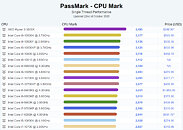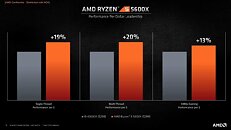Friday, October 23rd 2020

AMD Ryzen 5 5600X Takes the Crown of the Fastest CPU in Passmark Single-Thread Results
AMD has been improving its Zen core design, and with the latest Zen 3 IP found in Ryzen 5000 series CPUs, it seems like the company struck gold. Thanks to the reporting of VideoCardz, we come to know that AMD's upcoming Ryzen 5 5600X CPU has been benchmarked and compared to other competing offerings. In the CPU benchmark called PassMark, which rates all of the CPUs by multi-threaded and single-threaded performance, AMD's Ryzen 5 5600X CPU has taken the crown of the fastest CPU in the single-threaded results chart. Scoring an amazing 3495 points, it is now the fastest CPU for 1T workloads. That puts the CPU above Intel's current best—Core i9-10900K—which scores 3177 points. This puts the Zen 3 core about 10% ahead of the competition.
As a reminder, the AMD Ryzen 5 5600X CPU is a six-core, twelve threaded design that has a base clock of 3.7 GHz and boosts the frequency of the cores to 4.6 GHz, all within the TDP of 65 Watts. The CPU has 32 MB of level-3 (L3) cache and 3 MB of L2 cache.
Source:
VideoCardz
As a reminder, the AMD Ryzen 5 5600X CPU is a six-core, twelve threaded design that has a base clock of 3.7 GHz and boosts the frequency of the cores to 4.6 GHz, all within the TDP of 65 Watts. The CPU has 32 MB of level-3 (L3) cache and 3 MB of L2 cache.



141 Comments on AMD Ryzen 5 5600X Takes the Crown of the Fastest CPU in Passmark Single-Thread Results
Are you playing blind?
A little help? Are you ignoring other things also except me?You can try all you want but 5600X is replacing 3600X, you like it or not, understand it or not. I highly doubt the you dont, but just trying to distort reality for whatever reason. Couldnt care less why...
EDIT: typo
Ryzen 3600X: $249
Ryzen 5600X: $299.
299/249 = 1.2008
1.2008 ≠ 1.5
For what seems to be the hundredth time: the 5600X is not in the same tier as the 3600.Sure, part of why there isn't yet a 5600 is that while we wait for it, some people will get impatient and buy the X instead, increasing AMD's margins a tad and helping them amortize the R&D cost for the new architecture faster with higher ASP parts. For the rest of us, we can wait a bit, not get stressed out over stupid stuff, and get a non-X when it launches.
As for this double standard you're speaking of: I don't believe I've ever criticized either Intel or Nvidia for launching high end parts first and filling out the rest of the lineup later. As I said, it's standard industry practice, and not inherently problematic (partly due to the amortization of R&D costs I mentioned above).
And as for whether a 5600 non-X will be released: as I've gone into at length above, there have always been both X and non-X SKUs in the Ryzen 5 xx60 series. There is no reasonable reason for there not to be this time around, but you are for some reason expecting there not to be. You are the one expecting a change from the norm here, the one making a new assumption, and as such the burden of proof is on you. As for my reaction if there, against all odds, is no non-X coming, I've already gone into that too:If you actually read the posts of the people you were arguing against we would be having a much more productive discussion here.To be a monopolist, you need to be in a position where you can have a monopoly. Intel still outsells AMD by at least 3-4X. That is hardly a monopoly, right? As for you entering into a discussion, making a bunch of sensationalist claims with no backing, and then lashing out at and ignoring the people arguing against you, well ... that's on you.
No one like price hikes, but I'm sure this isn't all money in the pocket for AMD. I wonder if they bought IP to move their architecture forward. That would explain a hike. Might be the same IP that's finding itself in Zen2 and new consoles... Possibly a deferred cost model? Simple supply and demand for their CPUs is another factor. They have the product and increased market share to show for it now, no?
This isn't monopoly. This is capitalization. And they're doing it very well. They're not fixing the market and choke-holding us to buy their products. Intel arguably has become that, but only thanks to the same approach: capitalize. Which, for them, I believe was mostly a question of volume of supply (which is only shaky in the last few years), and establishing ISAs which other vendors then pay to implement and use. More IP.
There's only guilt when you fix/manipulate markets, like price-fixing (as ATI and NVIDIA once did some 15 years ago?) and purposefully breaking an existing market solution to artificially encourage the adoption of a bad product, for which you're the sole provider (electric cars, intel MMX).
Yeah we all miss the successors of the 3600 and the 3700X, but if prices seem a bit high, just wait.
More models will most likely show up, prices will go down, and Rocket Lake will probably affect prices in some way.
Stop comparing the 3700K to the 5800X, as we will most likely see some product in between there at some point.
The successor to the 3800X is the 5800X, obviously.You're the one who has to be reminded before you make yet another bitter post about not having the money for Ryzen 5000. Give it a rest already.
Clarkdale was a low end dual core.
Sandy Bridge was the successor to Lynnfield, the latter had lower clock speeds but still a very capable CPU. Both launched at over 300USD.
Now stop being bitter, we don't care.
And then there are all the benchmarks of real-world things people do with their laptops that you ignored, and where Tiger Lake completely rips apart AMD.
In fact, Tiger Lake as a laptop chip is as fast and quite often faster than the 10900K in many instances. For example, the Kraken 1.1 scores of 630/631 are better than the previous best score for any system - 730ms scored by a 10900K. Tiger Lake is hitting 630/631ms. That is a huge difference.
If any significant part of this gets in to Rocket Lake, Zen 3 won't be on top for very long.
Web Browsing :
Rendering :
Play a MMO :
Play an FPS :
Even a 6 core TL would possibly come close to Renoirs CPU performance.
www.notebookcheck.net/Asus-ZenBook-14-UX425E-Review-11th-Gen-Core-i7-Tiger-Lake-Debut.495286.0.html
Now I don't know why Intel still can't make 10 nm and 8 cores. Low yields with Cannon Lake and Ice Lake, I get that, but even to this day? Intel's 10 nm is a train wreck that keeps on pushin'. :D The architecture seems decent tho.
This is the R15 ST Tiger Lake vs 4800U - Tiger Lake is 27.1% faster here. :
Keep in mind Tiger is an Intel laptop chip, I'm now comparing to full on desktop chips -
This is vs the R5 3600 desktop chip, Tiger is 18.5% faster :
This is vs the R7 3800XT - the fastest AMD desktop chip here, Tiger is 8% faster:
And here, the fastest desktop chip you can buy for this ST benchmark the 10900K, is beaten by a Tiger Lake laptop chip:
We saw a long time ago that money overpower dignity.
Also mobile vs desktop doesn't make much difference when talking ST, since power limit becomes less of a limiting factor.
www.cpu-monkey.com/en/compare_cpu-amd_ryzen_7_pro_4750g-1560-vs-amd_ryzen_7_4800u-1142
That 2nd comment about power doesn't make sense. The 3800XT is 26% faster than the 4800U in single thread - the difference is entirely due to power limits since these are the same architecture chips. Diminishing returns, sure, but 26% is nothing to sneeze at. Yet that 105W desktop TDP part still loses to a 28W Tiger Lake part by 8%.
The per core performance difference between laptop Tiger Lake and the laptop Ryzen Renoir and desktop Ryzen Zen 2 parts is massive. For that matter the difference between Tiger Lake and Comet Lake is massive as well.
I did edit my last post so maybe you didn't get the comparison of the 15 W 4800U and the 65 W 4750G, both Renoir. The 15 W part barely runs slower in ST than the 65 W.
Judging by your logic, the 4800U would crush the 4750G if it could run at 65 W, which is not the case.
The 4800U is in fact crushed by the 3800XT by 26%. I just said that. If desktop variants of the tiger lake architecture gets a similar differential, it would crush a 10900K and a 3800XT by around 30% in single core.
What you say is holding back mobile TL must hold back mobile Renoir as well? That's your logic, and don't feel hurt that I carried it over to a different comparison, no offence was intended.So why not compare the 4800U with its desktop counterpart? By doing so we see exactly what happens when we go from mobile to desktop, ruling out a few differences.
SKL (and derivatives): 100% IPC
Zen 2: ~107% IPC (though that doesn't include latency-sensitive applications like games, number is based on AT's SPEC numbers)
ICL (and TGL, as there shouldn't be any IPC change) : ~118% IPC
Zen 3: ~107*1.19= 127.33% IPC. So even with TGL clocking slightly higher Zen 3 should have the upper hand, at worst they'll tie.
Is the intel defense Fund not paying you enough?
i've seen post like this on numbers forums from fan boys you really can't take heat AMD is putting out, so lets go and try to rain on peoples parade to make myself feel better... Get a life!
But again, great if true.